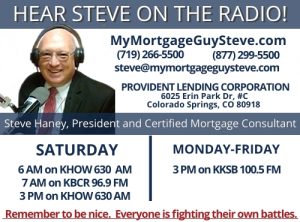The NRMLA says that reverse mortgages can be used to fund Long Term Care (LTC) or other health care needs. If you need help paying your medical expenses, call Steve today! (719) 266-5500

Different Needs – One Solution
Everyone’s needs are unique, but a desire to enjoy a full life is universal. Often, this means having enough money to cover bills and relieve the anxiety that comes from figuring out how to pay for medical and health-related expenses.
As many seniors have already discovered, a reverse mortgage can be an excellent financial tool for generating extra income to cover these costs.
A reverse mortgage enables homeowners 62 or older to convert part of the equity in their homes into tax-free income without having to sell the home, give up title, or take on a new monthly mortgage payment. It’s called a reverse mortgage because the flow of payments is reversed compared to a traditional home mortgage. The lender makes payments to you, or arranges a line of credit that’s available for your use. This differs from a traditional mortgage used to purchase or refinance a home, in which you must make monthly mortgage payments to a bank. With a reverse mortgage, you retain title to your home. The loan is repaid when you permanently leave your home, or if you violate the rules.
The versatility of reverse mortgages has already been demonstrated by over 1 million seniors who have used this tool to alleviate money worries or to simply make their retirement more comfortable. As the following profiles of actual borrowers illustrate, seniors have used reverse mortgages to cover a variety of medical and health care expenses.
Dorothy Rogers Paid for Her Prescription Medication
For 45 years, Dorothy Rogers has lived in the same single-story home in Hampton that she and her husband, John, and son, Thomas, built together. Tragically, in August 1976, Mr. Rogers suddenly passed away just 20 days before retiring.
“I lost John, his insurance, and most of his pension. I received a little of his pension but it lasted only about one year,” Mrs. Rogers says. To make ends meet, Mrs. Rogers relied on her Social Security. Initially, the monthly Social Security check she received was enough to survive. But over time, as inflation increased, the $743 she received was barely enough to cover her daily living expenses.
“I had a horrendous time paying for things,” she says. “Every time I went to the grocery store, I’d have to choose between prescription drugs or food. In the end, what I was getting from Social Security was going almost entirely to medicine.”
Those awful days of choosing ended on November 20, 2000, when Mrs. Rogers obtained a reverse mortgage. She now receives over $1000 a month in extra income for life! As Mrs. Rogers puts it, her life has completely changed for the better. She has no problem paying for prescription drugs, food, or bills.
“I thank God every day that I got a reverse mortgage,” she says. “I can go see a movie with the girls now, or get a sandwich. The first thing I did after getting the loan was go to the store and buy a steak.”


William Ellis Added a Downstairs Bedroom to Make His Wife More Comfortable
William Ellis, of Vancouver, WA, has a different story. In May 1988, his wife, Beulah Maria, suffered a debilitating stroke that left her wheelchair-bound.
“Her mind was still sharp but she was left partially paralyzed on her right side and had problems with her speech,” says Mr. Ellis. “I certainly didn’t want to see her put into a nursing home, I wanted her here with me.”
The solution was to convert the garage into a ground-floor bedroom to accommodate his wife’s needs. “The existing rooms and hallways were not wide enough to accommodate a wheel chair, so we had to make some modifications,” Mr. Ellis notes.
The modifications cost $42,000. To pay for the work, Mr. Ellis obtained a reverse mortgage with a line of credit. The reverse mortgage paid for the additional room plus other changes, including a walk-in shower.
“I got enough money to cover the costs to make these changes, plus some left over to cover everyday expenses,” explains Mr. Ellis. “The reverse mortgage really helped us out.”
Katrine Denese Receives 24-Hour In-Home Care, Thanks to Her Daughter
Katrine Denese, of Jacksonville, FL, suffers from paranoid schizophrenia and Parkinson’s Disease. But the last thing her four children wanted was to have her placed in a nursing home.
“My mother’s home is her security; she loves it there,” says daughter Janet Hayes. Though still able to function independently at times, Ms.
Denese, nonetheless, requires round-the-clock care because of dementia. Using money from her mother’s pension and Social Security, Ms. Hayes hired private caregivers to assist her mother.
“They help with everything — cooking, bathing, cleaning — you name it,” she says. Ultimately, it became clear that Ms. Denese’s pension and Social Security would no longer be sufficient to cover the caregivers’ fees.
Ms. Hayes thought about mortgaging her home to pay for a nurse but, in the end, chose a reverse mortgage. “I could have gotten a lot more money using a home equity loan but the interest rate was higher and there’s a monthly payment to make,” she adds.
Acting as power of attorney for her mother, Ms.Hayes arranged a reverse mortgage with a line of credit. “What sold me on the reverse mortgage was that even if my mother exhausts all the money, she still can stay in her home for as long as she needs to,” adds Ms. Hayes.
Hayes recommends the reverse mortgage to any adult child who has to care for a parent but doesn’t have the financial ability to do so. “It has been a life-saver for my mother.”


Versatility to Meet Your Needs
As illustrated by these real life stories, the versatility of reverse mortgages can provide you with a range of financial options that enable you to choose the kind of health or personal care you desire, in the setting you prefer. Because the funds from a reverse mortgage can be taken by the borrower as a lump sum, monthly payments, line of credit, or a combination of these, you have tremendous flexibility when planning how to address your health care needs. For example, you might choose to receive monthly payments to budget for often-overlooked needs such as a cleaning service, grocery delivery, or transportation. Or, you might select a line of credit because that’s the best strategy for you to pay your annual Medicare or private insurance deductibles or HMO co-payments on doctor visits and prescription drugs. No matter what your needs are, a reverse mortgage gives you more choices and a better way to plan your own care with confidence.










